Election Board: AAPS Recall Language Unclear
Washtenaw County election commission clarity/factual review hearing (Aug. 1, 2013): Unless the decision is appealed, a recall effort against six of the seven trustees on the Ann Arbor Public Schools board of education will not be moving forward with the originally proposed ballot language.
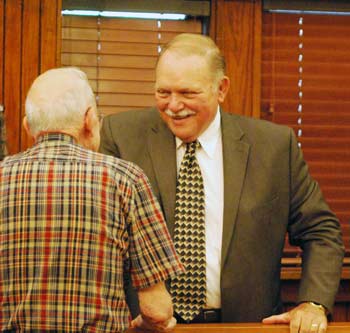
Donald Shelton, right, talks with former Ann Arbor Public Schools superintendent Scott Westerman, who attended an Aug. 1, 2013 hearing of the Washtenaw County election commission. Shelton, chief judge of the county trial court, chairs the commission, which held a clarity/factual review hearing for recall ballot language against six current AAPS trustees. For 18 years Westerman was a member of the men’s choral group Measure for Measure. Shelton is still a member. (Photos by the writer.)
Jody Huhn had submitted forms on July 17, 2013 to recall trustees Simone Lightfoot, Susan Baskett, Irene Patalan, Glenn Nelson, Andy Thomas, and Christine Stead. Patalan and Nelson did not attend the hearing. Three of the four trustees who did attend – Baskett, Thomas and Stead – addressed the commissioners, arguing that the recall language was not clear and not factual.
Huhn had cited four identical reasons in all six recall petitions: (1) failure to demonstrate thoughtful consideration of constituent priorities; (2) failure to demonstrate transparency in decision-making; (3) failure to demonstrate cohesive and singular direction as evidenced by consistent split voting; (4) failure to provide sufficient backing and support for district superintendent position as evidenced by high turnover rate averaging 2.25 years per term. [.pdf of recall petition language]
Board president Deb Mexicotte was not included because state election law prohibits the filing of a recall petition against elected officials who are in the first year of their term, if that term is longer than two years. Nor can such officials be recalled in the final year of their term, for terms longer than two years. Mexicotte was re-elected to a four-year term in November 2012, for the only AAPS trustee position on that ballot – so she is still serving the first year of her current term. This particular recall constraint was part of broader changes in state election law through Public Act 417 of 2012. [.pdf of Public Act 417 of 2012]
Related to item (4) in the proposed ballot language, the most recent AAPS superintendent, Patricia Green, turned in her resignation in early April after a little less than two years on the job. Her resignation took effect in mid-July.
Huhn had supported Ben Edmondson for the superintendent’s position. Edmonson, principal at district’s Roberto Clemente Student Development Center, had been one of six semi-finalists selected by the AAPS board in its current superintendent search, but was not picked as one of the two finalists. Those two finalists – Brian Osborne and Jeanice Kerr Swift – were not internal candidates. Last month the board offered the job to Osborne, but he ultimately rejected the offer. Earlier this week, the board made an offer to Swift, who has agreed to enter into contract negotiations. She currently is an assistant superintendent at a school system in Colorado Springs.
Huhn attended the recall language hearing, but declined to address the board.
The election commissioners are Donald E. Shelton, chief judge of the Washtenaw County trial court; Larry Kestenbaum, county clerk/register of deeds; and Catherine McClary, county treasurer. After hearing from three AAPS trustees, election commissioners decided to address the issue of clarity first, and if the language were deemed to be clear, they would then move on to discuss the issue of factuality. Initial steps of a recall require that ballot language be deemed clear and factual by the board of election commissioners in the jurisdiction of the elected officials who are the target of the recall.
The requirement that the language be factual was part of Public Act 417, enacted in late 2012. Early in the morning of Aug. 1, Kestenbaum sent an email to the other two election commissioners stating that he does not believe the factual-standard requirement is constitutional. [.pdf of Kestenbaum's Aug. 1, 2013 email] This is the first recall effort launched in Washtenaw County since the factual requirement became law.
After brief deliberations, the three commissioners voted unanimously that the recall language in all six petitions – which contained identical wording – lacked sufficient clarity.
McClary made a motion to address the issue of factuality, stating that the recall language did not appear to be factual. She felt it was important for commissioners to weigh in on that issue. Her motion died for lack of a second. Shelton and Kestenbaum indicated that there was no need to deliberate on that issue, since the question of clarity had already been determined and the law requires that the language must be both clear and factual.
Clarity/Factual Review Hearing: Public Commentary
Donald Shelton, who chairs the commission in his capacity as chief judge of the Washtenaw County trial court, began the hearing by asking Jody Huhn if she wanted to address the commission. “I’m good,” she replied, by way of declining his offer.
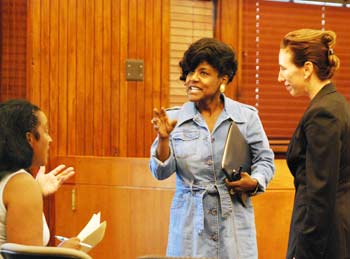
From left: Ann Arbor Public Schools trustees Susan Baskett, Simone Lightfoot, and Christine Stead before the Aug. 1 clarity/factual review hearing, which was held at the county administration building in downtown Ann Arbor.
Three trustees spoke to commissioners, starting with Susan Baskett. She described her self as a life-long resident of Ann Arbor and a 10-year member of the AAPS board of education. She was “hurt and dismayed” by the recall effort. “I felt I’d served honorably, on behalf of all the Ann Arbor Public Schools students and their families.” That includes listening to and learning from “anyone who’s been willing to teach me,” she said. Although she felt the recall was unwarranted, as a “true Democrat” she supported the right to mount a recall effort.
Baskett contested the recall language, saying it doesn’t meet the requirements of P.A. 417 of 2012, and she asked the commissioners to void this recall effort. She said she wasn’t a lawyer, but she had read the law – and “I do watch a lot of ‘Law & Order,’” she joked. Shelton replied, saying that given his regular job, “hearing from someone who’s not an attorney will be a welcome relief.”
Baskett stressed that the six trustees who were the target of the recall had not consulted with each other, nor had they hired an attorney to represent all of them. [Only Stead arrived with an attorney – Alan Harris, of the Bodman law firm. He did not formally address the commission.] Baskett said that while her arguments could apply to other trustees, she did not have their permission to speak on their behalf.
Each reason for the recall must be factual and of sufficient clarity, she noted, and if each reason doesn’t meet those standards, then the entire petition must be rejected. Baskett asserted that none of the reasons submitted for the AAPS recall were totally factual or had sufficient clarity.
The first reason – “failure to demonstrate thoughtful consideration of constituent priorities” – is very unclear, Baskett said. She challenged the definition of “thoughtful consideration,” and wondered how it could be proven. She said she could submit the names of people she has conferred with before and after nearly every vote. Baskett also wondered who the constituents are in this case. There’s a very diverse constituency for AAPS, and often those constituencies are conflicted, she said. Sometimes those constituencies are very vocal, and many times they are very quiet, she said. Baskett indicated that she has met with every group that has asked her to meet with them.
The second reason for the recall is “failure to demonstrate transparency in decision-making.” What is meant by transparency? Baskett asked. She said she makes an effort at the board table to clearly state her reasons for voting a particular way, and if reasons aren’t transparent, then the media will ask for clarification.
Baskett also contested the third reason for the recall: “failure to demonstrate cohesive and singular direction as evidenced by consistent split voting.” This is the most confusing, she said. If she is expected to consider constituent priorities thoughtfully, then given that the AAPS constituencies are diverse and often conflicted, “split votes should be expected.” Even so, the superintendent follows the direction of the prevailing vote, she noted.
Finally, Baskett addressed the fourth reason: “failure to provide sufficient backing and support for district superintendent position as evidenced by high turnover rate averaging 2.25 years per term.” This was also unclear and factually inaccurate, she contended. Although she voted against hiring the previous superintendent, Baskett said, she can provide a list of ways she offered guidance and support to Patricia Green. Baskett said she coordinated meetings with Green and key community leaders, including Yolanda Whiten of the Ann Arbor Community Center, Joan Doughty of the Community Action Network, and Bonnie Billups of Peace Neighborhood Center. As another example, Baskett said she called Green when the “transportation debacle of 2011 first bubbled up,” and had explained the importance of Green showing up to neighborhoods like Arrowwood and Foxfire, where students were most affected.
Regarding the issue of turnover, the 2.25 years per term needs to be clarified, Baskett said. The average includes two interim superintendents who were intended to be short-term.
Baskett concluded by saying that the recall language should be rejected because it’s not factual and it lacks sufficient clarity.
Andy Thomas also addressed the commission, challenging each of the four recall reasons on the basis of clarity and factuality.
He began by noting that this hearing groups together six individual trustees, with identical reasons given for the recall of each trustee. However, the circumstances for each trustee are different. He pointed out that the time frames for actions covered in these recall petitions are different, depending on the term of each trustee. Under Michigan law, an elected official is subject to recall only for actions that occur during his or her current term, Thomas explained. The current terms of two trustees [Nelson and Patalan] began in July of 2009, with terms for two other trustees [Stead and Baskett] beginning in January of 2011. Two additional trustees [Thomas and Lightfoot] began their current turns in January 2012.
It appeared that the petitioner wanted to recall the entire board, Thomas said, but the reasons for a recall must apply to each individual trustee – “and that trustee alone,” he said.
Thomas then gave point-by-point objections to each recall reason. He objected to the first statement – “failure to demonstrate thoughtful consideration of constituent priorities” – for reasons of clarity, saying that the language is vague and unspecific. There’s no standard for “thoughtful consideration,” nor is there any objective way to measure thoughtfulness, he said. The petition also doesn’t address which constituents didn’t receive thoughtful consideration, or how priorities of multiple constituents might be weighed against each other, or how those priorities were articulated.
Thomas also contended that the first reason isn’t factually correct, saying he has listened to and given thoughtful consideration to concerns of many individuals. He said he’s the only trustee who schedules regular coffee hours with constituents. As chair of the board’s performance committee, he said he recently convened a meeting at the Roberto Clemente Development Center to address concerns of the Friends of Roberto Clemente group. As secretary of the board, he said he responds to all correspondence addressed to the board and has personally answered over 400 emails during the first six months of this year alone. He said he responds to specific concerns, and doesn’t just send out a form letter. Many constituents thank him for his thoughtful responses, Thomas said. “It is simply not true that I have not demonstrated thoughtful consideration of constituent priorities,” he said.
Regarding the second reason – “failure to demonstrate transparency in decision-making” – Thomas objected based on clarity and factual accuracy. The language doesn’t establish any threshold for transparency, or give any specifics about how to demonstrate transparency. It doesn’t even offer a working definition of transparency, he noted. Also, all board meetings are subject to the state’s Open Meetings Act, Thomas said, and are open to the public. Most meetings are televised, and board decisions are made by a vote in public. Items are typically presented at two separate meetings prior to a vote, he reported, “giving the public ample opportunity to familiarize themselves with the issues and offer their comments or concerns.”
He noted that regular board meetings and committee meetings are posted on the AAPS website and are open to the public. For two straight years, the district has received the highest rating given by the Sunshine Review, a transparency in government watchdog group, Thomas said. The district has held numerous meetings on issues like the budget and the superintendent’s search, he noted. The charge in the ballot language regarding transparency is untrue, he said.
Thomas also objected to the third reason: “failure to demonstrate cohesive and singular direction as evidenced by consistent split voting.” There are so many problems with this statement that it’s hard to know where to start, he said. Because the language is directed at him as a single trustee, it’s difficult to see how he’s failed to demonstrate cohesive and singular direction. “A single trustee cannot be cohesive – this is an attribute of the board as a whole,” he contended. Nor does a single trustee have the power over the entire board to create a singular direction.
The language on split voting is particularly troublesome, he said. It implies that an individual trustee is responsible for the votes of the other trustees. If he votes with the majority of trustees and another trustee is in the minority, it only happens after lengthy debate, Thomas said. Is it the expectation that he is responsible for convincing the other six trustees that he’s right? And if he’s not successful, is this sufficient reason for a recall? Or if he’s in the minority on an issue, should he vote against his conscience for the sole purpose of creating a unified vote? It’s the nature of a democracy that there will be legitimate differences of opinion, he said, and split votes simply underline this fact. A board that votes 7-0 on all issues “would be an oligarchy, not a democracy,” he said.
In addition, the third reason for the recall is factually incorrect, Thomas argued. The board has articulated a cohesive and singular direction by adopting the district’s strategic plan and mission statement. Also, split votes “are the exception, not the norm for this board.” The vast majority of votes are 7-0, he said, and split votes occur only on a small number of contentious issues.
Lastly, Thomas addressed the fourth recall reason: “failure to provide sufficient backing and support for district superintendent position as evidenced by high turnover rate averaging 2.25 years per term.” He noted that public officials can only be recalled for actions during their current term. So the historical rate of superintendent turnover is not relevant. The proposed ballot language doesn’t specify a time period during which this turnover occurred. However, it appears to cover a much longer period than his current term of a year and seven months.
He also objected on grounds that the fourth was factually incorrect. The 2.25-year turnover average “appears to have been pulled out of thin air. As my ninth grade algebra teacher used to tell me, ‘Show your work.’” The only way to come close to this number is to include interim superintendents as part of the turnover, he noted, and an interim is not intended to be permanent.
In conclusion, Thomas stated that the language is problematic on multiple levels. The language is vague, subject to multiple interpretations, and doesn’t confine itself to his current term in office, as is required by law. It asserts as truth things that are factually incorrect or that can’t be substantiated in an objective way. “It is simply a hot mess.” He urged the commission to disallow the ballot language.
The final speaker was Christine Stead, the AAPS board’s vice president, who noted that the spirit of her concerns about the language had already been expressed well by her board colleagues. She said she had read the email sent out earlier that day by Larry Kestenbaum, one of the election commissioners, regarding whether the commission would address the issue of factuality. There are some difficulties in establishing facts asserted in the proposed language, she noted. Specifically, Stead cited the turnover rate of 2.25 years, given that the trustees have different terms. It’s also possible to dispute whether interim superintendents should be included in that rate.
Stead said she’s concurred that much of the language is mostly stated as opinion. That’s true with the first three reasons given in the proposed language, she noted, pointing to problems with factuality as well as clarity. Regarding the issue of split votes, she reported that she reviewed her own voting record and that 95.58% of votes cast were passed unanimously. That would challenge the notion of consistent split voting, she said. Similarly, the number for superintendent turnover rate would be different for her term, compared to other trustees.
Recall Language: Commission Deliberations
Catherine McClary began deliberations by clarifying that if any one item is found to be unclear or not factual, it would invalidate the entire petition. Donald Shelton and Larry Kestenbaum indicated that her understanding was correct. McClary then noted that previously, the commission only had to deal with clarity issues. Under the new law, did each item need to be clear and factual?
Shelton replied that each item must be clear and factual. In response to another query from McClary, Shelton explained that if it’s not clear whether the stated reasons apply to a trustee’s current term in office, then the language is improper on a clarity basis.
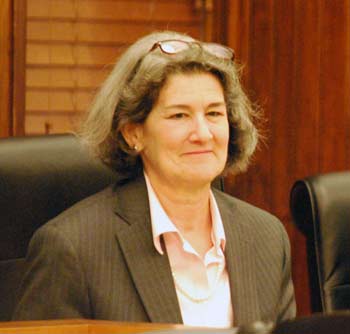
Washtenaw County treasurer Catherine McClary, who is also a member of the county election commission.
Shelton also noted that he had read the email from Kestenbaum and that he was familiar with the issue that Kestenbaum had raised. [Kestenbaum also had brought copies of his statement to be distributed at the meeting.]
In his email, Kestenbaum argued that the factual-standard requirement is unconstitutional by citing the following passage of the Michigan constitution, and calling out the final sentence for emphasis: “Laws shall be enacted to provide for the recall of all elective officers except judges of courts of record upon petition of electors equal in number to 25 percent of the number of persons voting in the last preceding election for the office of governor in the electoral district of the officer sought to be recalled. The sufficiency of any statement of reasons or grounds procedurally required shall be a political rather than a judicial question. ”
Kestenbaum’s email concluded that: “The sufficiency of reasons for recall is a political question. It is specifically not a judicial question. If the election commission and the courts can determine the truth or falsity of reasons for recall, then the power to judge these questions has been removed from the people.”
In his email, Kestenbaum stated that during the review of the proposed ballot language for the AAPS trustees, he would apply the standard of clarity. That’s the other part of the standard, which was also part of the law before Act 417 of 2012 was passed.
During the Aug. 1 hearing, Shelton laid out these points, saying that there’s a significant constitutional issue about whether any election commission can make factual determinations. He suggested that the commission consider the petitions first with regard to clarity. Then, if they determined that the language is clear, they could move to the factual question. If the language was unclear, they wouldn’t need to address the issue of factuality, he said. McClary and Kestenbaum concurred with that approach.
Speaking to the question of clarity, Kestenbaum said there have been numerous court decisions on what constitutes clear language for a recall. It’s not clear to simply put on a recall petition that someone isn’t doing a good job, he said – it’s a “nebulous assertion that doesn’t point to any specific thing.” The six petitions before the commission, which are all identical, are simply “a more long-winded way of saying ‘These people are not doing a good job.’” The more deeply you look at the language, he added, “the more nebulous it gets.”
Kestenbaum noted that if this recall moved forward, petitioners would need to carry around six separate petitions and get separate signatures for each petition. However, he suggested that the commission could address all six petitions in one motion, since the petitions are identical. He then made the following motion:
Resolved: That the reasons stated in the recall petitions submitted by Jody Huhn against Ann Arbor Public Schools trustees Susan Baskett, Simone Lightfoot, Glenn Nelson, Irene Patalan, Christine Stead and Andy Thomas are not of sufficient clarity to enable the officer of this recall that is sought and the electorate to identify a course of conduct which is the basis of the recall.
McClary supported the motion, but wanted to make two amendments. She wanted the record to reflect separate resolutions for each petition, even though the commission would be acting on them with one vote. That’s because the petitions are against individual trustees, not the group, she explained.
She also wanted the resolution to state that it does not appear the reasons given for the recall occurred within the terms of office for the AAPS trustees. Kestenbaum argued that the commission didn’t need to speak to that issue in its motion. McClary replied that as long as the point was encompassed as part of the lack of sufficient clarity, she was fine with the resolution.
Shelton took McClary’s first amendment as a friendly one, meaning that no separate vote was required on that amendment.
Shelton explained his view on the clarity issue, saying it was the way that the law requires the commission to look at it. He asks himself two questions. Would an ordinary voter – when confronted with a petition on their porch or grocery store parking lot or voting booth – clearly understand the allegations that are being made against the office holder? Secondly, are the allegations clearly stated so that the targeted elected officials could reasonably defend themselves? “To me, those are the reasons why this commission is here,” he said – to protect voters from signing a petition that might mean different things to different people, and to give elected officials a reasonable opportunity to state their response.
If these petitions were approved and got enough signatures to appear on the ballot, the ballot would also contain a statement of defense by each targeted elected official. Shelton said that when he read the petition and looked at each of the four allegations separately and as a whole, “frankly, my answer was no as to both of those questions.”
Addressing the individual allegations, Shelton said that demonstrating thoughtful consideration “is in the eye of the beholder.” Transparency is a word that’s used a lot, he noted, but he didn’t understand what was intended by transparency in decision-making. He also said he wouldn’t know what “cohesive direction” or “split voting” means, if he were reading the language on his porch. Regarding the “failure to provide sufficient backing and support” for the superintendent, Shelton said “I guess that depends on whether you agree with the proposition to be supportive or opposed.” In his view, the language wouldn’t be clear to the voter or targeted official.
Outcome: The three election commissioners unanimously voted that the petition language lacked sufficient clarity.
McClary then offered six motions stating that the reasons in the recall language “appear not to be factual.” Noting that she respected Kestenbaum’s position, McClary said “I think that we would be remiss if we don’t deal with the factuality under the new law.”
She thought that “failure to demonstrate thoughtful consideration of constituent priorities” could be true. Failure to demonstrate transparency seems not to be true, she said, given evidence presented to the commission about the Sunshine Review’s assessment of AAPS. The commission got data on split voting and superintendent turnover, McClary noted, so she didn’t think those allegations were true either. “I think it would behoove this election commission to be on record in each of the six instances that we don’t believe that the petitions appear to be factual.”
Kestenbaum pointed out that under the law, the petitions are required to be both factual and clear. “So finding it to be unclear is sufficient,” he said, and it’s not necessary to proceed with the question of factuality.
“I’ll use the lawyer word,” Shelton said. “I think it’s moot, given our finding on clarity.”
Shelton then declared that McClary’s motions had died for lack of support, and the meeting was adjourned.
Recall Process
It’s possible to appeal a decision by the county election commission. An appeal must be made within 10 days to the county circuit court. In Washtenaw County, that’s the 22nd circuit court. Donald Shelton is chief judge of both the circuit and probate courts, which are collectively known as the Washtenaw County trial court.
The process is laid out in Public Act 116 of 1954, section 168.952(6):
The determination by the board of county election commissioners may be appealed by the officer whose recall is sought or by the sponsors of the recall petition drive to the circuit court in the county. The appeal shall be filed not more than 10 days after the determination of the board of county election commissioners. If a determination of the board of county election commissioners is appealed to the circuit court in the county, the recall petition is not valid for circulation and shall not be circulated until a determination of whether each reason is factual and of sufficient clarity is made by the circuit court or until 40 days after the date of the appeal, whichever is sooner. [.pdf of recall process and timeline]
This hearing is also likely the final one to be presided over by Shelton. State law stipulates the composition of the election commission as the county treasurer, county clerk and chief probate judge. Although Shelton is chief judge of the probate court, he was not elected as a probate judge – but rather as a judge to the 22nd circuit court. He has designated the senior probate judge, Nancy (Francis) Wheeler, to take the spot on the election commission.
The Chronicle could not survive without regular voluntary subscriptions to support our coverage of public bodies like the Washtenaw County election commission. Click this link for details: Subscribe to The Chronicle. And if you’re already supporting us, please encourage your friends, neighbors and colleagues to help support The Chronicle, too!




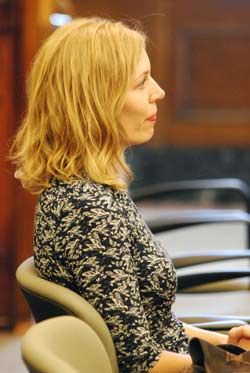
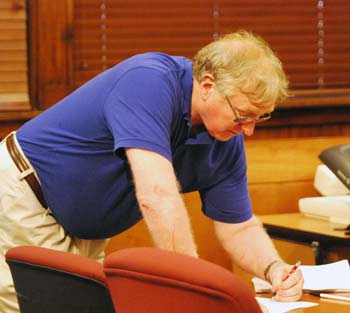
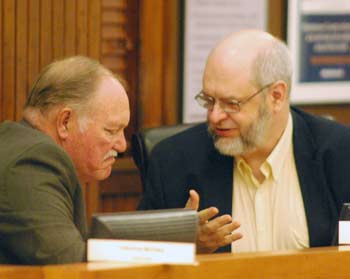
Donald Shelton is retiring at the end of his term.
Likely the most respected judge on the circuit court bench; he and Nancy Francis are the only long-time Democrats to sit at the county level as judges.
Judge Shelton, along with Nancy Francis, allowed unmarried couples to adopt and Washtenaw was the only one of Michigan’s 83 counties to approve such adoptions. This practice ended in 2002 when then-chief Judge Archie Cameron Brown re-assigned all adoption cases to himself and dismissed those applications – which was a hardship for many unmarried couples, some of whom had invested large amounts of attorney fees and time in pending adoption procedings. This action by Brown was motivated by communications with then-Chief Justice Maura Corrigan objecting to Shelton and Francis’ interpretation of the state adoption code. Gay rights groups were angry over this action by Brown.
Donald Shelton, also, is the only sitting circuit judge to reside outside of Ann Arbor. He hails from Saline.